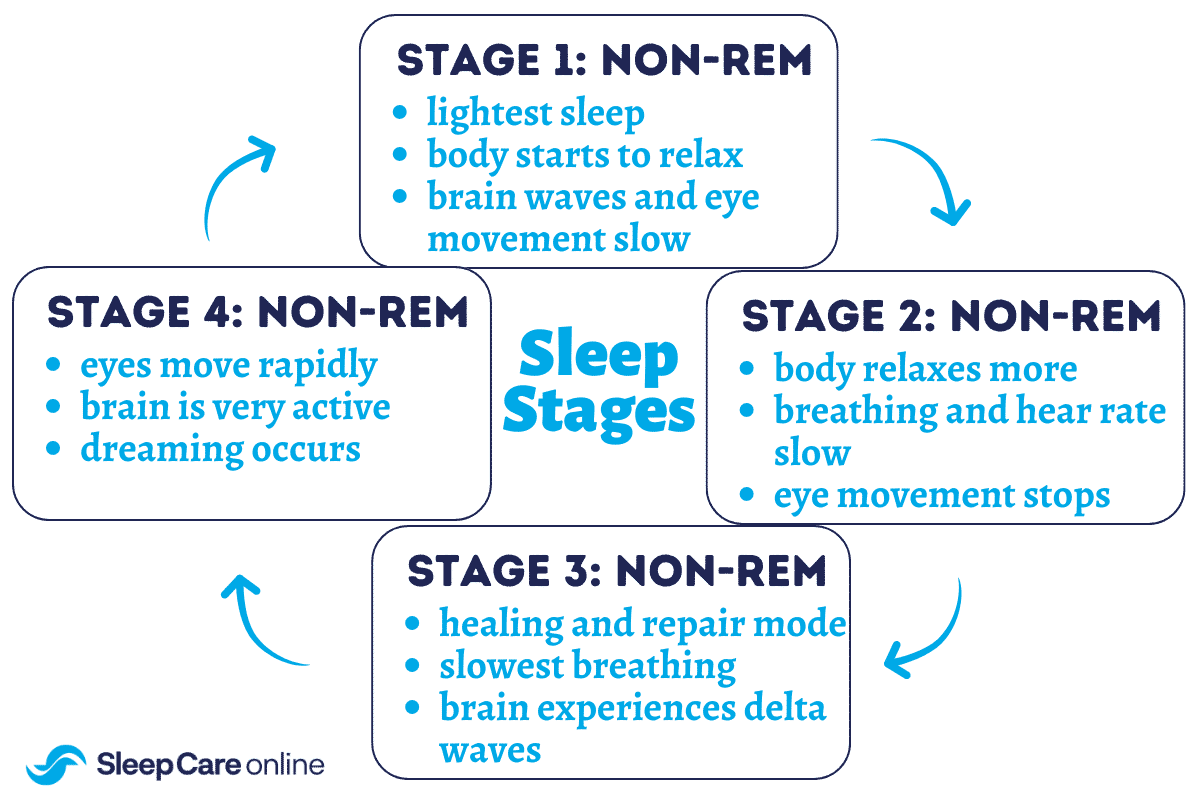A person will go through four stages of sleep as they are sleeping at night. Each sleep stage has a specific function and responsibility to restore and maintain your brain’s overall cognitive performance. The first three stages of sleep are considered non-rapid eye movement (NREM) sleep, and the fourth is referred to as rapid eye movement (REM) sleep.
Why Do We Need Sleep?
There are many reasons we need sleep, including:
- Energy conservation: Sleeping helps to conserve energy and reduces our caloric needs because our bodies function at a lower energy as they are sleep.
- Cellular restoration: Sleep allows cells to repair and grow. Processes, like muscle repair, protein synthesis, tissue growth, and hormone release, all occur as a person is sleeping.
- Brain function: Sleeping helps the brain to reorganize its nerve cells, clearing our waste from the central nervous system. While asleep, your brain’s glymphatic system removes toxic byproducts and other buildup, resulting in a well-working brain when a person wakes up the next day. Functions of the brain that are positively affected by sleep are learning, memory, problem-solving skills, decision-making, focus, and more.
- Immunity: Sleep contributes to a healthy and strong immune system. While asleep, the body makes proteins that fight infections, which is why sleep is so critical when a person is sick.
- Weight maintenance: Sleep controls a person’s hunger hormones like ghrelin (which increases appetite) and leptin (which increases the feeling of being full after eating). Lack of sleep imbalances these hormones, and can cause a person to eat more calories and gain weight.
- Emotional well-being: During sleep, brain activity increases in areas that regulate emotion. This helps a person to react responsibly to a number of events that can happen throughout the day.
- Proper insulin function: Insulin is a hormone in the body that helps your cells use glucose (sugar) for energy. If your body doesn’t produce the proper amount of insulin, it may result in high blood glucose levels and perhaps Type 2 Diabetes.
What is a Sleep Cycle?
A sleep cycle is a process that involves both NREM and REM sleep. This cycle repeats every 80 to 100 minutes, resulting in 4-6 cycles per night depending on how much sleep a person gets.
What Affects the Different Sleep Stages?
If you are having trouble sleeping at night, your sleep cycle will be affected, cutting it short and having to repeat that stage in the cycle. Some factors that affect sleep stages include:
- Age: Sleep naturally becomes lighter in old age, and older people tend to be more easily awoken.
- Alcohol: Alcohol is a stimulant that can keep you awake and disrupt your circadian rhythm.
- Recent sleep patterns: If your sleep becomes irregular or insufficient over a few days, this will affect your typical sleep cycle.
- Sleep disorders: Certain sleep like sleep apnea and restless leg syndrome can interrupt a healthy sleep cycle.
Sleep apnea is a sleeping disorder that makes a person repeatedly start and stop breathing throughout the night due to obstruction in the airways. Common causes and symptoms of sleep apnea include snoring, obesity, waking up gasping for air, daytime headaches, and more. If you are affected by one or multiple of these symptoms, get tested for sleep apnea right away. Sleep Care Online offers a safe, quick, and affordable way to get tested for sleep apnea in the comfort of your own home. Learn more online here. If you have any questions, please call our expert team at 866.465.4478
What Happens If You Don’t Get Enough Sleep?
Sleep deprivation can have many short and long-term effects on the body. Sleep deprivation can increase the risk of mental health disorders (like depression and anxiety), make you feel tired and unfocused during the day, increase your risk of chronic health problems (like heart disease, diabetes, stroke, obesity, and more), and decrease your overall quality of life.
